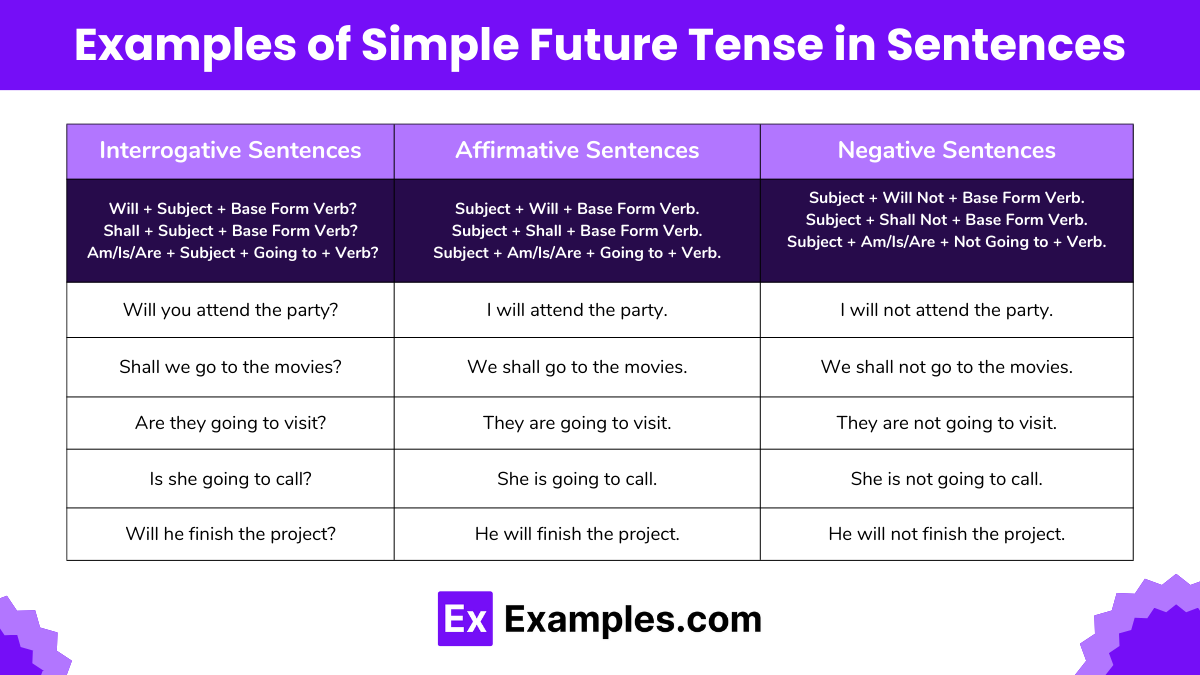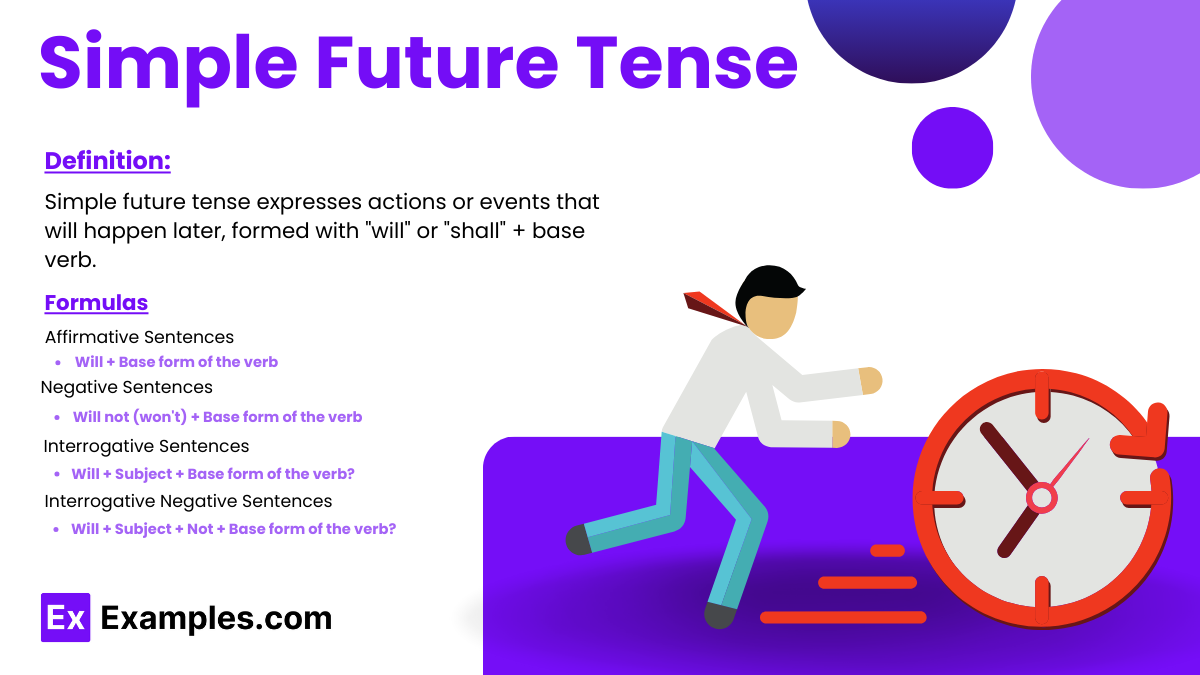50+ Simple Future Tense Examples
The simple future tense is used to describe actions or events that will occur later. It is formed with “will” plus the base form of the verb. For example, in the sentence “She will travel to Paris next year,” “will travel” indicates a future action. This tense is commonly used for predictions, promises, and decisions made at the moment of speaking.
What is the Simple Future Tense?
The simple future tense is used to describe actions or events that have not yet occurred. It is formed using ‘will’ followed by the base form of the verb, as in ‘will go’ or ‘will eat.’ This tense is typically used for predictions, spontaneous decisions, or promises about the future.
Functions of the Simple Future Tense
The simple future tense is essential in English for various purposes. Understanding its functions can enhance clarity and effectiveness in communication. Here are the key functions of the simple future tense:
- Predictions: It expresses expectations about what may happen in the future, often based on personal judgment or opinion. For example: “It will rain later.”
- Decisions Made at the Moment of Speaking: This tense is used for decisions made spontaneously, not pre-planned. Example: “I’ll go for a walk after lunch.”
- Promises and Offers: It conveys commitments or voluntary actions that will take place in the future. Example: “I will finish the report by tomorrow.”
- Assumptions: It is used to express assumptions or guesses about what might occur, usually regarding the near future. Example: “They will probably arrive late.”
- Scheduled Events in the Future: Though typically covered by the present simple, the simple future can also denote scheduled events, especially in informal contexts. Example: “The meeting will start at 10 AM tomorrow.”
Simple Future Tense Formula
The simple future tense is straightforward to construct and use. It is formed by combining the auxiliary verb “will” with the base form of the main verb. Here’s how you can structure sentences in the simple future tense:
1. Affirmative Sentences:
Formula: Will + Base form of the verb
- Example: “I will go to the store tomorrow.”
2. Negative Sentences:
Formula: Will not (won’t) + Base form of the verb
- Example: “She will not (won’t) attend the meeting.”
3. Interrogative Sentences:
Formula: Will + Subject + Base form of the verb?
- Example: “Will they travel to France next year?”
4. Interrogative Negative Sentences:
Formula: Will + Subject + Not + Base form of the verb?
- Example: “Will you not (won’t you) join us for dinner?”
Rules of Simple Future Tense
The simple future tense is used to express actions that will occur in the future. To use it effectively, it’s important to understand its rules and applications. Here are the key rules for forming and using the simple future tense:
- Formation Using “Will”:
- Basic Structure: The simple future tense is generally formed with the modal auxiliary “will” followed by the base form of the main verb.
- Example: “I will travel to New York next month.”
- Formation Using “Going to”:
- While “will” is common, “going to” is also used to express the future, especially for planned actions or when there is evidence something will happen.
- Example: “She is going to start her new job next week.”
- Negatives:
- To make a sentence negative in the simple future, add “not” after “will.”
- Example: “He will not (won’t) finish the project today.”
- Questions:
- For questions, invert “will” and the subject.
- Example: “Will you attend the party tomorrow?”
- Spontaneous Decisions:
- Use “will” when deciding to do something at the moment of speaking.
- Example: “I’ll take this one, please.”
- Promises and Offers:
- “Will” is often used for making promises or offers.
- Example: “I will help you with your homework.”
- Predictions Without Evidence:
- When making predictions without factual basis, “will” is suitable.
- Example: “It will probably rain tomorrow.”
Forming of the Simple Future Tense
The simple future tense is used to indicate actions that will occur in the future. It’s a versatile tense with a few different methods of formation depending on the context and nuance you want to convey. Here are the primary ways to form the simple future tense in English:
1. Using “Will”
Will is the most common auxiliary verb used to form the simple future tense. It can express decisions, promises, offers, and predictions that are made spontaneously or without prior planning.
- Affirmative Form: Will + base form of the verb
- Example: “I will start a new book tonight.”
- Negative Form: Will not (won’t) + base form of the verb
- Example: “I will not attend the party tomorrow.”
- Interrogative Form: Will + subject + base form of the verb?
- Example: “Will you help me with this project?”
2. Using “Going to”
Going to is used to talk about planned actions or intentions, and predictions based on present evidence or signs.
- Form: Subject + be (am/is/are) + going to + base form of the verb
- Affirmative Form:
- Example: “She is going to study abroad next semester.”
- Negative Form:
- Example: “He is not going to buy a new car this year.”
- Interrogative Form:
- Example: “Are they going to move to a new city?”
3. Using “Shall”
Shall is a more formal auxiliary, often used with “I” and “we” to make offers or suggestions, or to ask about preferences in a polite manner. It’s less common in American English but still used in British English.
- Form: Shall + base form of the verb
- Affirmative Form:
- Example: “Shall I open the window?”
- Negative Form: Shall not (shan’t) + base form of the verb
- Example: “We shall not proceed without further discussion.”
- Interrogative Form: Shall + subject + base form of the verb?
- Example: “Shall we start the meeting?”
Examples of Simple Future Tense in Sentences

- Predictions: “I think it will rain tomorrow.”
- Spontaneous Decisions: “I will answer the phone.”
- Promises: “I will send you the details by email.”
- Plans: “She is going to start her new job on Monday.”
- Offers: “I will help you with your project tonight.”
- Assumptions: “They will probably join us later.”
- Threats: “He will not tolerate any more delays.”
- Scheduled Events: “The meeting will start at nine o’clock.”
- Volunteering: “We will clean up after the event.”
- Formal Suggestions: “Shall we go for a walk after dinner?”
Simple Future Tense Interrogative Examples
An interrogative sentence in the simple future tense is a question about something happening later. It starts with words like “will” or “shall” and seeks info or confirmation about future plans or possibilities. It’s a way to discuss what’s going to happen later and engages readers by prompting them to think about future actions or events.
Here are some examples of interrogative sentences in the simple future tense:
- Will you attend the meeting tomorrow?
- Shall we go for a walk in the park later?
- Are you going to visit your parents next weekend?
- Is she going to finish her project on time?
- Will they join us for dinner tonight?
- Can you help me with my homework tomorrow?
- Are we going to watch a movie this weekend?
- Will he arrive before the party starts?
- Do you think it will rain tomorrow?
- Shall we book our tickets for the concert in advance?
Simple Future Tense Affirmative Examples
Affirmative sentences in the simple future tense convey certainty or intention about future actions or events. They are used to make predictions, promises, or decisions about what will happen in the future. These sentences often do not contain any negative words or expressions and are straightforward in their expression of future actions.
Here are some examples of affirmative sentences in the simple future tense:
- I will visit my grandparents next weekend.
- She is going to start her new job on Monday.
- We shall attend the conference next month.
- They will complete the project by Friday.
- He is going to buy a new car next year.
- The company will launch its new product in January.
- Sarah is going to travel to Europe next summer.
- The team will win the championship this season.
- I am going to learn Spanish next semester.
- We will celebrate his birthday tomorrow.
Simple Future Tense Negative Examples
Negative sentences in the simple future tense deny future actions or events using “will not” or “won’t.” They express refusal, disbelief, or uncertainty about what will happen later. These sentences add contrast and depth to writing by introducing conflict or doubt about future outcomes.
Here are some examples of negative sentences in the simple future tense:
- I will not attend the party tonight.
- She is not going to buy a new house next year.
- We shall not go on vacation this summer.
- They will not finish the project on time.
- He is not going to join the gym.
- The company will not launch the new product until next quarter.
- Sarah will not travel abroad this year.
- The team is not going to participate in the tournament.
- I will not forget to call you tomorrow.
- We shall not eat out tonight.
Passive Voice Simple Future Tense Examples
In the simple future tense, the passive voice emphasizes the receiver of the action rather than the doer. It’s formed with “will be” + past participle. For instance, instead of “I will deliver the package tomorrow,” it’s “The package will be delivered tomorrow.” This structure is used when the doer is unknown or less important, focusing on the action or its consequences. It’s handy for discussing future plans or expectations concisely.
Here are some examples of sentences in the simple future tense written in the passive voice:
- The report will be submitted by the end of the week.
- The new software will be installed tomorrow.
- The cake will be baked by Mary for the party.
- The project will be completed by the team next month.
- The letter will be sent to the recipient by email.
- The event will be organized by the committee.
- The tickets will be purchased online.
- The house will be cleaned before the guests arrive.
- The announcement will be made by the CEO.
- The repairs will be done by the maintenance crew.
How do you write Future in Simple Tense?
To write in the future simple tense, use the base form of the verb with “will” or “shall.” It indicates actions or events that will occur later. For example: “I will go.”
Is going to Simple Future Tense?
Yes, “going to” is often considered a form of the simple future tense. It’s used to express future plans, intentions, or predictions. For example, “She is going to attend the conference tomorrow.”
What does Future Simple Mean?
The future simple tense refers to a grammatical structure used to describe actions or events that will occur at a later time. It’s constructed using an auxiliary verb (such as “will” or “shall”) followed by the base form of the main verb. For example, “I will travel tomorrow.”



